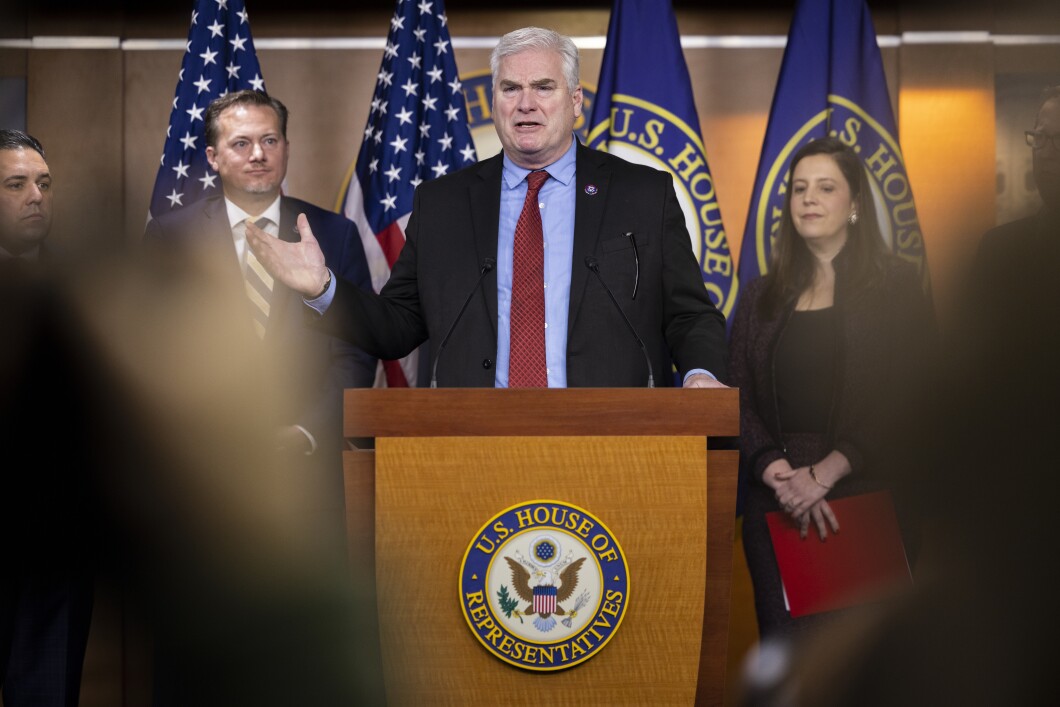
Rep. Tom Emmer (R-MN) played a key role in building the new House Republican majority. Now, as House majority whip, he’s helping to coach it, a familiar position going back to his ice hockey days.
Emmer, first elected in 2014 to Minnesota’s 6th Congressional District in the northern and western Minneapolis exurbs, was twice chairman of the House Republicans’ campaign arm, where he had a strong run. Heading the National Republican Congressional Committee in 2020, Emmer oversaw the effort that shaved down the House majority that the Democrats won two years earlier, boosting House Republicans’ ranks by 14 seats. And in 2022, with Emmer again chairing the NRCC, Republicans nabbed the House majority halfway through President Joe Biden’s White House term — although they only have a narrow 222-213 edge over the Democrats.
SPEAKER FIGHT TAUGHT HOUSE GOP KEY LESSONS, SAYS CHIEF DEPUT WHIP GUY RESCHENTHALER
Emmer’s House Republican colleagues rewarded him by backing him for majority whip in a contest where he beat out rival Rep. Drew Ferguson (R-GA) on the first ballot and Rep. Jim Banks (R-IN) on the second, by a 115-106 vote. That made Emmer the third-highest House Republican leader behind Speaker Kevin McCarthy (R-CA) and House Majority Leader Steve Scalise (R-LA).
The majority whip’s job is officially to whip House votes for the party’s position on leadership, but the role is as much about being the eyes and ears of the conference and knowing how to make members succeed. That’s all hard-earned experience from Emmer’s eight years in the House, on top of six years as a state representative, his work as a city councilman, and his work as an attorney and establishing a youth hockey team in the 1990s, where the father of seven and onetime collegiate hockey player himself learned how to get people to work together.

Emmer immediately drew on those skills in the opening days of the closely divided House. He helped McCarthy rally the support needed to secure the speaker’s gavel amid a group of conservatives threatening to derail the California Republican’s bid. The effort took 15 ballots, and three-and-a-half days, before McCarthy finally won in the wee hours of Jan. 7.
“It’s like problem-solving, right? People are entitled to their opinions,” Emmer told the Washington Examiner about trying to overcome dissension in the House GOP ranks. “We’re entitled to our emotions. We’re entitled — all of that is just human stuff, right?”
Emmer recalled working in his office with House Chief Deputy Whip Guy Reschenthaler (R-PA) to figure out a way to victory for McCarthy.
“We did the [speaker] first vote that Tuesday — I can’t remember how many we did before we went to adjourn. And then we ended up in here, Guy and I ended up in here with just a few members,” Emmer said. “I won’t get into which ones, but having a discussion — and by the way, they were on the opposite side of Kevin. So the discussion was, ‘Is there a path?’ How do we get there? And at that point, they weren’t too inclined to talk that way.”
It helped grease the ultimate agreement that led to McCarthy’s eventual win. The rules package that will govern the operations and priorities of the 118th Congress passed the House after McCarthy used it to barter a deal with conservatives in exchange for the speaker’s gavel. The 55-page package includes an end to proxy voting as well as a return to the traditional “motion to vacate,” which allows any member to bring forward a motion to oust the speaker.
Additionally, instead of an omnibus bill, all 12 appropriations bills will be considered and passed separately. Two new committees also were created: one to investigate China and the other to investigate the “weaponization” of federal agencies under the Biden administration. The rules package further calls for lawmakers to have 72 hours to review bills before voting on them. Moreover, the House side of the Capitol would be reopened to the public.
“It’s like, ‘You guys can make some significant changes — and significant changes, by the way, that the entire conference agrees with,” Emmer said about GOP House holdouts against McCarthy.
Emmer, who was the 2010 Minnesota Republican gubernatorial nominee, noted that he doesn’t expect his job to be easy over the course of the next two years. But the speaker’s race was a good “practice run” for what’s ahead, noting that hearing out members about their concerns and maintaining strong communication on where members of the conference stand will be a key part of his strategy.
“It was a great practice run for us. I mean, we literally set up our whip team on the fly, the whip counters, we couldn’t rely on others to do things on the floor. So we literally stepped it up, put that together. I called it practice,” Emmer said. “Imagine this is what we’re going to be doing as a whip operation, so just we’re going to use it, we’re going to do some test things right and see how it works like a fire drill.”
The Minnesota Republican said he believes his background as a hockey coach has also provided him with a skill set that will be beneficial for his new leadership gig.
“A good coach celebrates the team when they’re successful and, by the way, takes all the responsibility when they fail. I think that’s the No. 1 rule,” Emmer said. “And you also have to get your team to believe in the mission that you’re setting out to — if they trust in the leadership, and if the leadership knows what they’re doing, teams can achieve things that they really never should have been expected to achieve.”
Emmer offered a more specific hockey analogy.
“It’s recognizing, like I did with every team I’ve coached, that every player has a role, and if that player is not performing, it affects everybody else,” he said. “That comes from the top scorer on the team to the penalty kill guy that’s out there for just a few minutes of every game, and you were only as strong as your weakest link. So everybody gets held to the same standard, everybody has the same consequences, and then they all start leaning on each other.”
With the razor-thin majority, Emmer acknowledged that there are likely to be significant hurdles during the course of the next two years, with factors like occasional absences potentially being a problem.
“I think the biggest challenge is going to be human issues,” he said. “We’ve got members who have lives at home and, you know, making sure that people take care of themselves and stay healthy.”
CLICK HERE TO READ MORE FROM THE WASHINGTON EXAMINER
But while Democrats utilized proxy voting during the 117th Congress, making it easier to pass legislation, Emmer said that he is glad that Republicans got rid of the pandemic-era practice. Proxy voting was being abused and shouldn’t have been extended for as long as it had, according to the congressman.
“If you don’t want to come to work, then get a different job — proxy voting and Zoom hearings and all of this nonsense should never have happened,” Emmer said.





